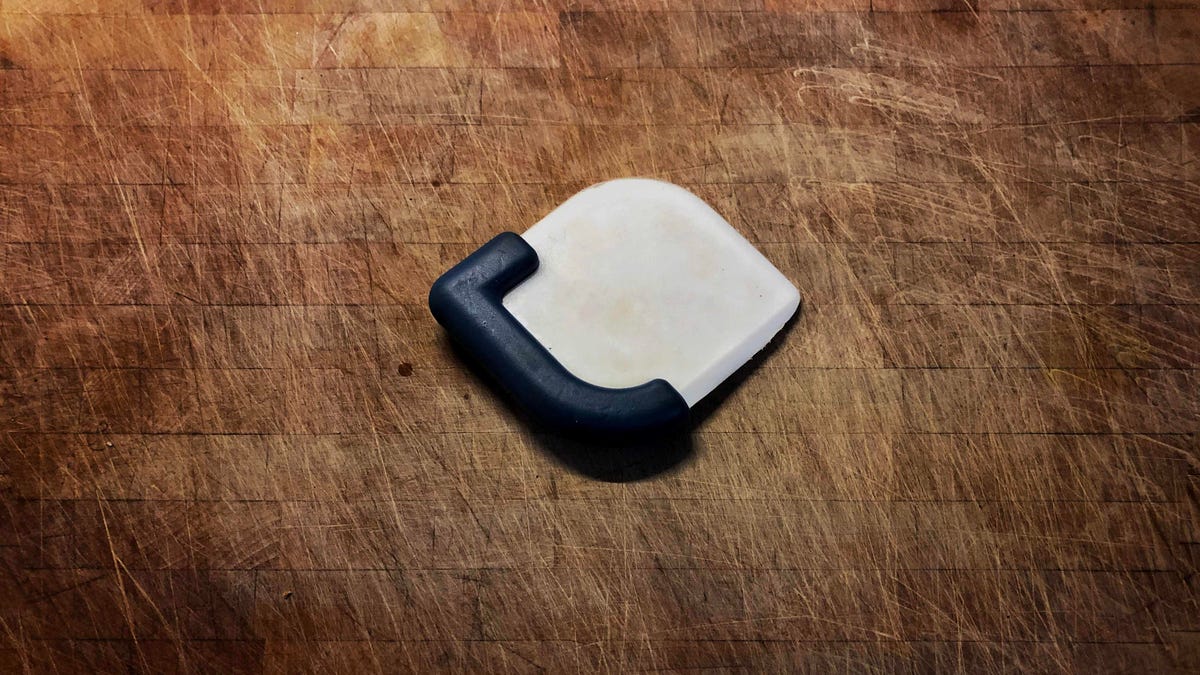 Why You Can Trust CNET
Why You Can Trust CNET Stop scrubbing dirty pots and pans. Use this simple kitchen tool instead
Set aside your sponge or steel wool this holiday season and learn to love the pot scraper.

A pot scraper. It could change your life.
I worked as a dishwasher twice in my life. The first time was at a sleepaway summer camp in northern Connecticut, where we served hot food to 300 sweaty children three times a day. Next, at a Bruegger's Bagels in Burlington, Vermont, among other tasks I washed prep pans, bread knives and mixing bowls in service to delicious breakfast carbs. I even once prepared a bagel for then Rep. Bernie Sanders (sesame, plain, not toasted, if I remember correctly.)
I had no pot scraper at either gig. I wish I had. All that time wielding pull-down sprayers and staring down towers of soiled stainless cookware helped me appreciate an alternative that I didn't discover until later, once I'd grown. As we approach holiday cooking season, and the inevitable stacks of messy plates, nests of used silverware and grease-rimed cookware, throw away your scouring sponge and your bristle brush. Invest in a cheap pot scraper.
A pot scraper is a thin piece of plastic -- usually nylon -- with a beveled edge. It often has a thicker piece of plastic wrapped around its top edge as a grip. With a pot scraper, you can remove seemingly any cooking matter that has baked or dried onto a pot.
My kids, aged 5 and 9, are made almost entirely of my wife's macaroni and cheese. Homemade mac and cheese requires a turn in the oven, which of course results in a crust of burnt cheese stuck to the rim and sides of the baking dish.
Read more: Best Thanksgiving meal delivery for 2021
Mostly she uses an enamel-lined cast-iron dish for mac and cheese, but sometimes she uses glass. A bristle brush might get the pot clean eventually. Soaking the dish with water and dish soap can help, but inevitably it ends up transferring the leftover cheese and sauce to the bristles themselves, which you then have to clean separately or else end up with a rotten crud wand stinking up your sink.
This is dumb. It also takes longer than using a scraper, and it wears out the brush bristles since you have to really bear down to get everything up.
The old way.
Don't scrub, scrape
With a scraper, you can soak your dish first. Or not. Whether it's glass or enameled cast iron or stainless, your scraper doesn't care. Does it need elbow grease? It might, but you won't hurt your scraper if you really lean into it. To clean it, you simply wipe off whatever food remains with your finger and flick it into the sink. Hit it with a soapy sponge and some hot water if you must. Done.
Hate scrubbing eggs off your frying pan? A scraper will deal with those eggs. Burnt-on pie filling or barbecue sauce? Caramelized onions from a roasted chicken? A scraper will clean off all of that.
There is no soap receptacle to deal with on a scraper. It doesn't retain odors. It doesn't get in the way of your faucet handles or need a hook to hang from like a bristle brush does. It won't scratch your nonstick coating.
A lesson, and a recommendation
I'll end with an anecdote from the kitchen of that summer camp. We had just served macaroni and cheese for dinner. I was on pots that shift, which meant hand-washing a stack of commercial baking pans, each one caked with burnt-on béchamel, cheese and flecks of prison-grade pasta. That day, I scrubbed.
I had a scouring sponge and a box of soapy steel wool pads for when things got serious. I scrubbed and scrubbed and an hour later I was the last one in the kitchen. My colleagues had departed to sneak a cigarette or run around outside with some unappreciative children. It was me and the corner of a pasta elbow that had somehow fused with the stainless steel pan. It wouldn't come off.
Read more: Gift Guide 2021
My instructions were to clean all the pans. This pan wouldn't clean. I contemplated taking the pan and burying it in the woods. Instead, I left that pan and that bastard piece of pasta to soak overnight.
I came back in for the breakfast shift. The pan was still there. I poured out the soapy water and picked at the macaroni husk with my finger. It wouldn't come off. I scrubbed again. Nothing. I sighed, put the pan aside and turned my attention to a baking sheet covered in sausage grease. Had you eaten whatever the chef made in that pan next, you might have tasted a hint of soapy gluten. If I'd had a pot scraper, I might have saved you.

